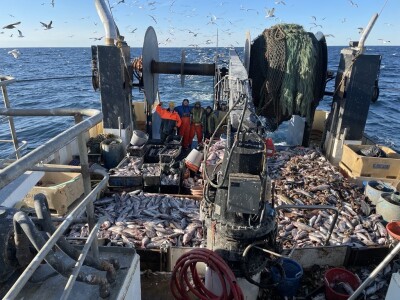GEORGES BANK — It was May 14, a Thursday. The big yellow Caterpillar roared to life beneath us, throbbing through the steel deck plates; a signal that it was time to cast off the surly bonds of earth. Capt. Ron Borjeson backed the Justice down. The spring line came taut and groaned. From its Fish Island berth, the black 82-foot hull began to swing slowly into the shipping channel until the prow pointed directly toward the hurricane dyke. We bore away for Georges Bank, in the wake of generations of New Bedford fishermen who sailed from here before us, all bound for what Melville termed “the watery part of the world.”
The Justice is a scallop boat, but as the net reel above the stern ramp proclaimed, we were rigged for groundfish. But this was to be no ordinary fishing trip. Kevin Stokesbury was heading a scientific expedition, targeting groundfish but trying to count rather than catch them. The flatfish net on the Justice was designed to enable fish to pass through the mouth and escape through the open end unharmed. Their passing would, however, be filmed by cameras mounted inside the net, with their number and species recorded on video and stored for later analysis.
Professor Stokesbury, the chair of the Department of Fisheries Oceanography in UMass Dartmouth's School of Marine Science and Technology, is well-known for his pioneering work with scallops. His introduction of video surveys in the 1990s, using a drop camera to film scallops on the sea floor, transformed the conventional scallop survey. It was a quantum leap forward, delivering an accurate and cost-effective method that helped in correcting a stock assessment that had been significantly underestimating scallop biomass and constraining fishermen. The boon to the industry stemming from the expanded estimates contributed enormously to New Bedford attaining its status as the nation’s top fishing port, a record that now extends to 14 consecutive years.
Read the full story at the Standard-Times >>
Read more about Northeast groundfish >>






